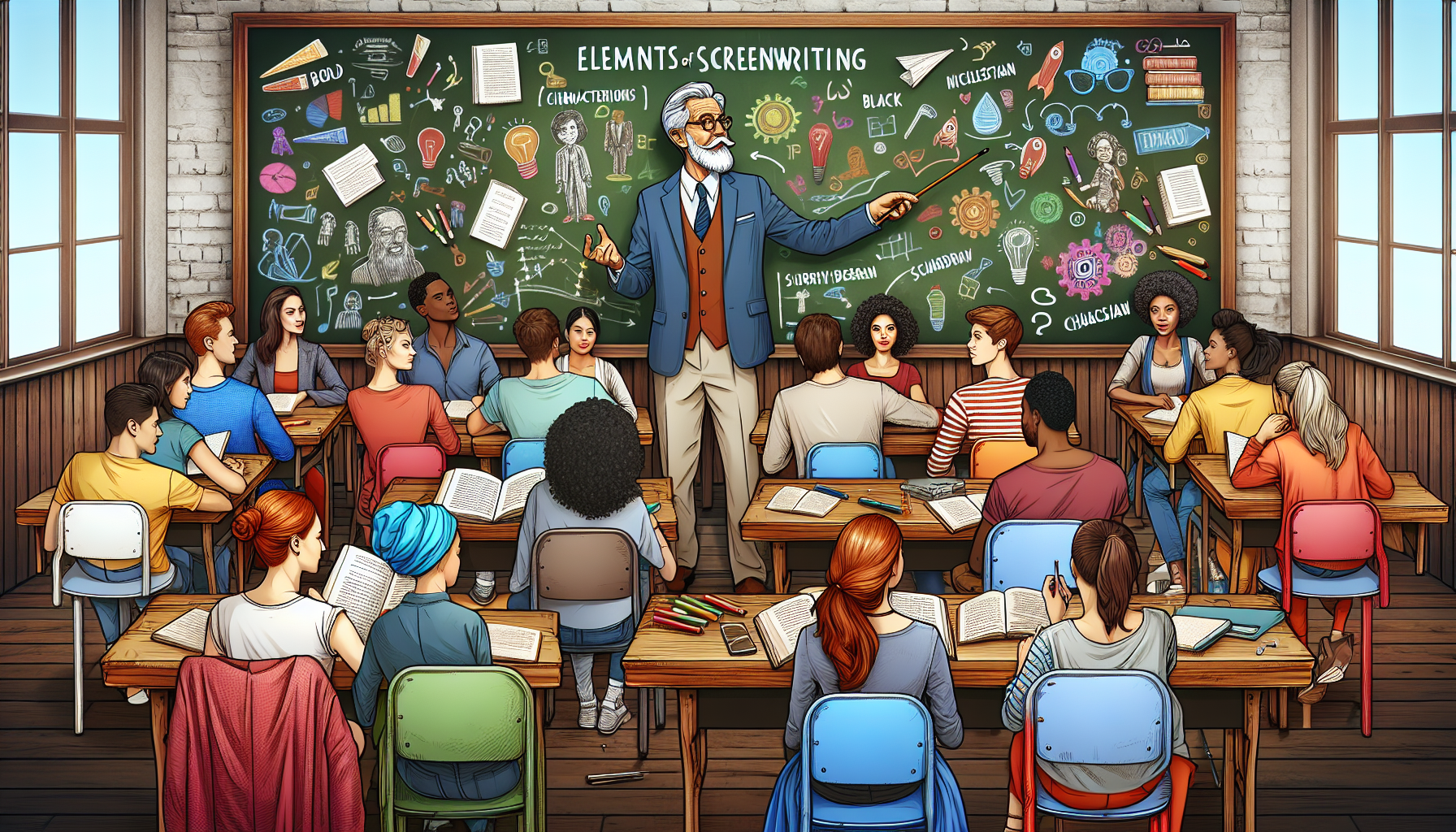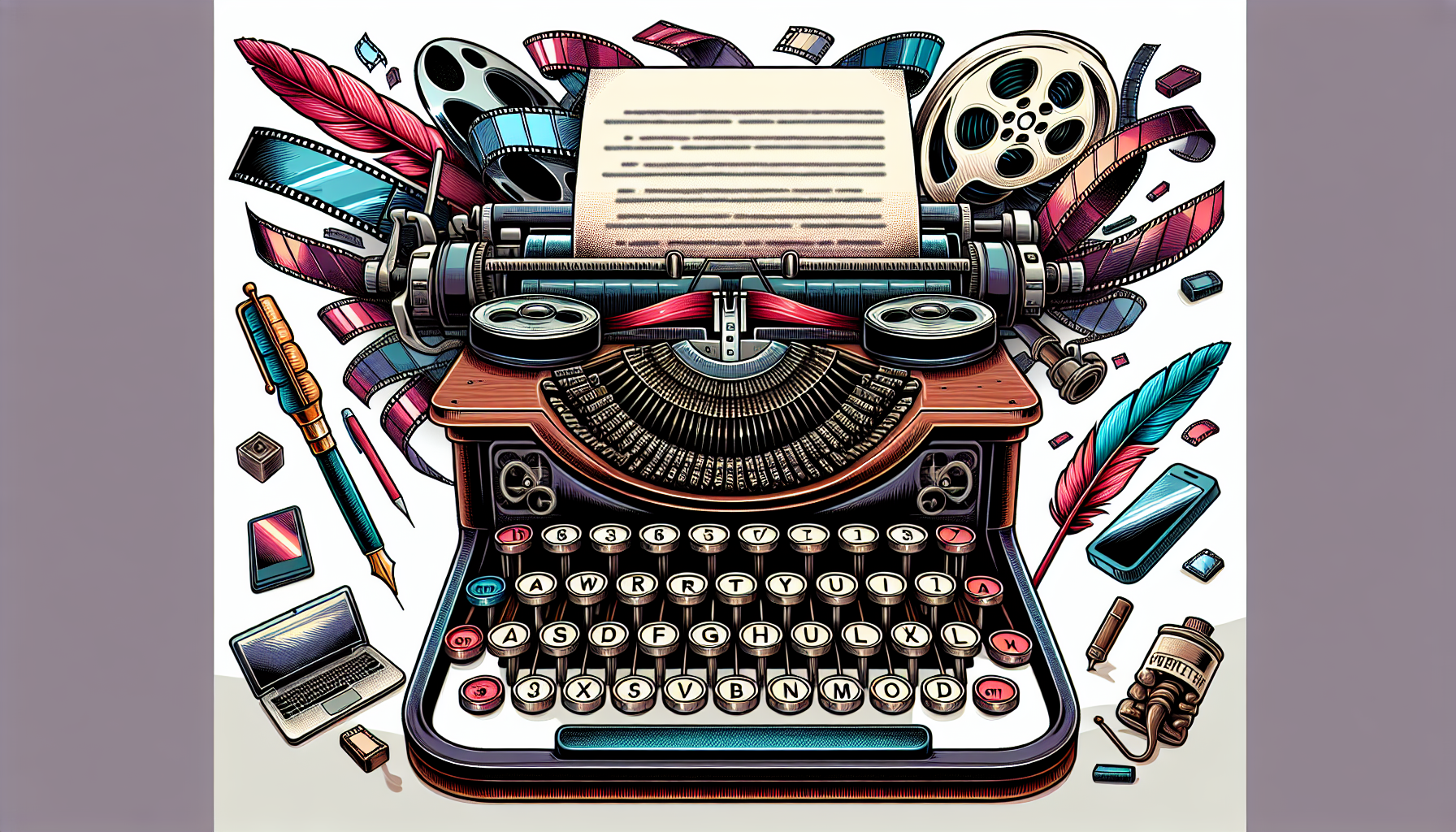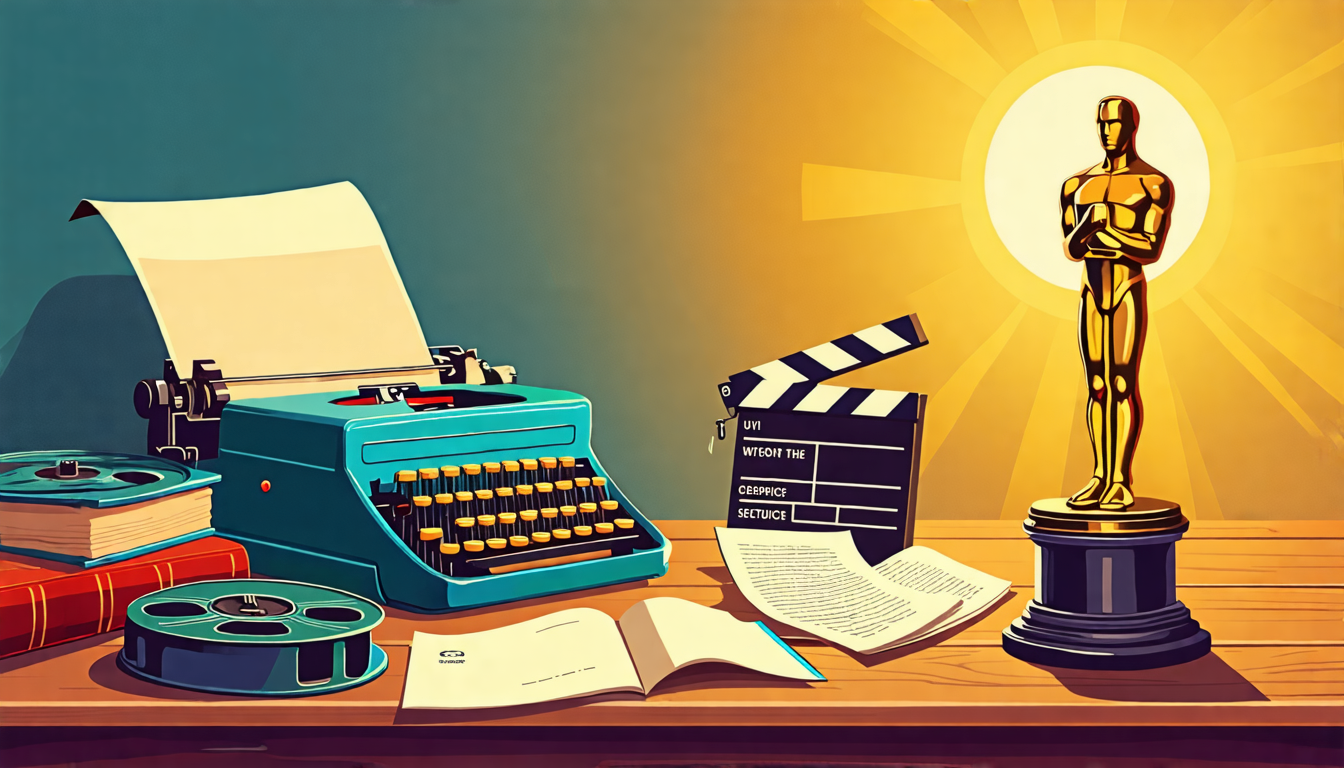
Introduction to Masterclass Screenwriting: Capturing the Magic of Storytelling
Imagine you could unlock the secret sauce of Spielberg or unwrap the narrative genius of Nora Ephron with the flick of a pen. Welcome to the dizzying world of masterclass screenwriting, where the mysteries of compelling storytelling are demystified for the ambitious scriptwriter. In this article, we don’t just spill the industry beans; we serve them up with a side of insider tricks and a dash of witty banter!
But first, what exactly is a masterclass in screenwriting? Think of it as a Michelin-starred feast for your writing prowess—a carefully curated experience that propels budding writers from mundane to marquee. Here, the art of storytelling isn’t just taught; it’s transformed into a canvas of infinite possibilities. Masterclass screenwriting isn’t about following a rulebook; it’s about learning to write the rulebook yourself. Boring characters and snooze-fest plots? Not in your script!
As we dive into this guide, expect to unwrap the core components of screenplay writing that could make even a blockbuster blush. From teetering on the tightrope of tense dialogue to orchestrating an opus of well-layered characters, we’ll explore how to turn that glimmer of an idea into cinematic gold. Gear up, future Hitchcocks and Tarantinos—your masterclass in screenwriting is about to commence!
Introduction to Masterclass Screenwriting: Capturing the Magic of Storytelling
Imagine you could distill the essence of magic—turning ideas into stories that captivate hearts and minds. That’s masterclass screenwriting for you, folks! Designed not just for the dreamers but for those ready to roll up their sleeves, this type of learning experience is akin to being handed the secret recipe for Hogwarts’ most bewitching potions. A masterclass in screenwriting is not a casual YouTube tutorial you watch while scarfing down a greasy taco; it’s an immersive experience that could elevate your scribbles into the next box office sensation.
In essence, a masterclass in screenwriting delves deeply into the craft, turning the aspirational fog into a clear trajectory towards cinematic excellence. Here, you’ll find seasoned professionals sharing their trials and triumphs, ensuring that you, too, can navigate the tumultuous waves of creativity and technical prowess needed to excel. It’s no less than strapping yourself into the captain’s seat of Starship Screenplay.
The Spellbinding Importance of Storytelling
Now, why should storytelling in screenwriting matter more than the popcorn at the cinema? It’s simple—storytelling is the heart that pumps blood into the veins of any screenplay. Without a compelling story, characters wander aimlessly, and dialogues sound like they were lifted from a poorly translated user guide. Masterclass screenwriting ensures you craft tales worth telling, stories that linger in audiences’ minds long after the credits roll, much like that embarrassing memory of calling your teacher mom in third grade.
Whether your script is a tear-jerking drama or a belly-aching comedy, the principles of storytelling remain your guiding stars. Masterclass screenwriting sessions emphasize originality infused with universal emotions and situations, creating a script that resonates well with diverse audiences. It’s about carving out human experiences into 120 pages of screenplay gold.
Key Concepts of Screenwriting Unleashed
Ladies, gentlemen, and non-binary royalty, brace yourselves as we unleash the Kraken of concepts typically covered in a smashing screenwriting masterclass. From the anatomy of a plot twist to creating dialogues that sizzle hotter than a summer barbecue, these classes cover the A to Z of screenplay crafting. You’ll learn to sketch characters that leap off the page, begging you to root for them, despise them, or simply wonder at their complexity.
Furthermore, masterclass screenwriting shines a glaring spotlight on the structural pillars of a screenplay. Forget cookie-cutter templates; think more along the lines of constructing your narrative arc like an architect on a caffeine high—meticulously, creatively, and with a slight touch of madness. It’s about understanding the rhythm of a story—where to accelerate the tension or take a moment for a soft, emotional whisper.
But wait, there’s more! Our fabulous screenwriting journey also dives deep into the ocean of thematic exploration—how to weave your theme into the narrative organically without making it feel like a neon sign. By the end of a masterclass, you won’t just write a screenplay; you’ll architect an experience, a world that once lived only in the folds of your brain.
To put it snazzily, equipping yourself with masterclass screenwriting skills is like being handed the Infinity Gauntlet of the screenplay universe, empowering you to turn stones into epic sagas (with hopefully fewer casualties than Thanos). So, buckle up and prepare to inject that spark of extraordinary into the mundane, transforming your story from ‘meh’ to ‘yay’ with the power of well-crafted screenwriting!
Stay tuned as we dissect the mystical components of the screenwriting masterclass in our next segments. You wouldn’t want to miss out on the juicy secrets that could potentially have you thanking your Oscar amidst an uproarious applause, would you?
Core Components of a Screenwriting Masterclass: Structure, Dialogue, and Character Development
Strap in, future Spielbergs and Shonda Rhimeses! We’re about to dissect the meat and potatoes of masterclass screenwriting. The hearty trio of story structure, zesty dialogue, and multi-dimensional character development are on the menu. Understanding these can transform your screenplay from a snoozefest to a blockbuster, or from a soap box to a profound narrative that could leave even the stoic critics teary-eyed.
Story Structure: The Backbone of Your Screenplay
Every great screenplay needs a sturdy skeleton; this is your story structure. Imagine this as the architectural blueprint of your movie or TV show. It’s basically what keeps the narrative from collapsing into a confusing pile of ideas. In masterclass screenwriting, instructors harp on about the classic three-act structure—Act 1: Setup, Act 2: Confrontation, and Act 3: Resolution.
Act 1 is your hook. Here, you introduce the world and the characters, along with the inciting incident that propels your main character into the fray. Ever noticed how in ‘Jaws’, you barely get a chance to feel the sand between your toes before that ominous music starts? That’s Act 1 done right.
Act 2 deals with the ‘meat’ of the story, often chunkier and juicier, filled with obstacles and subplots. This is where your characters earn their development stripes. Challenges, peak action, and emotional depths explored here make Act 3 worth waiting for.
And then comes Act 3, the resolution. Every thread, every tear, every laugh finds its place. It’s where questions are answered, and the characters’ journeys come to a culmination – preferably not always as viewers predict.
Dialogue: Not Just Words, but Your Character’s Lifeblood
Let’s talk dialogue, because, let’s be honest, what’s a movie without those iconic lines that linger long after the credits? Frankly, my dear, I don’t give a darn (Gone with the Wind), anyone? In masterclass screenwriting, dialogue is not just chit-chat. It reveals character traits, underscores conflict, and advances the plot. It’s about making each word earn its keep on the page.
Tips to sharpen your dialogue:
- Read it out loud: If it sounds unnatural coming from your mouth, it’ll sound doubly weird from your characters’.
- Subtext is your friend: Not everything needs to be said outright. Sometimes, what’s NOT said makes the loudest noise.
- Keep it concise: Unless your character is delivering a grand soliloquy (and you’re no Shakespeare), keep those dialogues snappy.
Character Development: Making Audiences Invest
Next up in the triad is character development. Masterclass screenwriting teaches that characters are the heartbeats of your story. No one’s going to care about your mind-bending plot if they’re not invested in the characters. Think of Jack and Rose in ‘Titanic’; their romance amidst disaster made it the colossal epic that still captivates hearts.
Character arcs are crucial: your characters shouldn’t be the same people they were when they first appeared on screen. They have to evolve, face their demons, or perhaps become them. Their journeys should intertwine seamlessly with the plot, making their victories (and failures) resonate with the audience.
Insider Tips:
- Flaws are fabulous: Perfect characters are boring. It’s their flaws, quirks, and inner conflicts that make them relatable and interesting.
- Backstories matter: Knowing where they’re coming from helps audiences connect on a deeper level. Yet, beware of the infamous info dumps!
- Consistency is key: While characters evolve, they should still remain true to their core unless a plot twist justifies drastic changes.
By mastering these core components in masterclass screenwriting—robust story structure, crisp dialogue, and layered character development—you can craft scripts that not only entertain but resonate and remain with your audience. So, what are you waiting for? Grab that scriptwriting software, a hefty dose of creativity, and let’s churn out some screenwriting magic!
Advancing Your Screenwriting Skills: Practical Exercises and Expert Advice
So, you’ve mastered the basics of screenplay mastery—kudos to you! But, as any fervent pastry chef will tell you, the real fun begins when you start decorating the cake. In the realm of masterclass screenwriting, this stage is all about refining those narrative layers and adding delightful textures. Let’s whisk through some practical exercises and pearls of wisdom from screenwriting savants that will elevate your script from good to Where’s the Oscar? worthy.
Exercise Your Screenwriting Muscles with Practical Magic
First up, let’s get physical (well, not really, but you get the gist). Engaging in practical exercises is like taking your script to the gym. These workouts aren’t about lifting weights; they’re about lifting ideas. Here’s a cheat sheet to pump up those creative biceps:
- Scene Rewriting: Take a classic scene from a film you adore and rewrite it. This isn’t about making it better, but about making it yours. How would you have had those star-crossed lovers meet? On the moon? In a submarine? The crazier, the better!
- Character Swap: Swap the protagonist and antagonist roles in your screenplay. This not only yanks you out of your comfy narrative shoes but also teaches you more about each character’s motives and fears. Who knew your villain had a soft spot for stray kittens?
- Dialogue Duels: Write a page of dialogue where two characters argue over something mundane, like the right way to brew tea. Through such ludicrous debates, you’ll discover each character’s voice. Does your hero really talk like a Shakespearean knight at a teashop?
Each exercise, while seemingly playful, helps extend your narrative elasticity and prepares you for any story somersaults the script might throw at you.
Decoding the Masters: Wisdom from the Screenwriting Greats
Now, who wouldn’t want some secret sauce for their scriptwriting stew, right? It’s time to sieve through some expert advice straight from the horse’s mouth (or, in our case, the director’s chair). Here’s what the screenwriting gurus have to utter about navigating the rocky roads of Rivendell-like scriptwriting adventures:
- Embrace the Flaws: Many seasoned screenwriters emphasize embracing imperfections in early drafts. Got a plot hole so big you could drive a bus through it? Great! Recognize it, embrace it, and then pave it. This shift towards accepting flaws can transform your script faster than you can say “rewrite!”
- Kill Your Darlings: This age-old advice isn’t about offing your favorite characters (though sometimes, maybe it is). It’s about not getting too attached to your clever line of dialogue or that poetic description of the sunset on Mars. Sometimes, the story simply works better without them.
- Feed on Feedback: All that feedback isn’t just noise—it’s gold dust. Successful screenwriters advocate for soaking up all kinds of critiques, chomping on them, and spitting out a script that’s tougher than a two-dollar steak. It’s all about iteration and reiteration.
Each nugget of seasoned advice is a stepping stone toward scripting Nirvana. Integrate them into your practice, and you’re sure to see a dramatic uptick in the depth, texture, and dynamism of your screenplays.
The Spiral Staircase of Continuous Improvement
Last but not least, let’s talk about making sweet, sweet love to the process of continuous improvement. You see, writing is less like a straight line and more like a spiral staircase where every turn brings you back around to where you started, but slightly higher up. Masterclass screenwriting isn’t just about reaching the top; it’s about appreciating the climb.
Establish a routine of revisiting and revising your scripts. Each iteration should peel back a layer, revealing finer subtleties and stronger narratives. And guess what? There’s no final draft—only the one you pry from your cold, caffeinated hands to finally submit to the film festival.
Oh, and mingle! Join screenwriting forums, attend workshops, and sip coffee in suspiciously dimly lit literary cafés. Surround yourself with other scribes who are as dedicated to the craft as you are. In the echoing words of every screenwriting masterclass: never stop learning, never stop writing, and when in doubt, write some more.
By engaging with practical exercises, mulling over expert advice, and committing to the endless road of refinement, your screenwriting skills won’t just improve; they’ll flourish. Now, go write that screenplay that makes readers rally for a sequel, even before they’ve finished the popcorn!
Now, Go Forth and Script Your Masterpiece!
As our journey through the labyrinth of masterclass screenwriting comes to a close, remember that each tip and trick you’ve tucked into your writer’s toolkit is a golden key to the kingdom of compelling narratives. It’s time to step away from the theoretical and plunge into the bustling world of plot twists and heart-wrenching character revelations!
No More Excuses!
Yes, your first draft might be rougher than a pirate’s beard, but that’s just the nature of the beast. Embrace the chaos of creation, refine through revision, and remember that even the most celebrated screenwriters started with a blank page and a blinking cursor.
The Never-Ending Story (of Learning)
With every script you write, each dialogue you tweak, and every character flaw you explore, your prowess in the art of screenwriting will continue to grow. Let the wisdom imparted by each masterclass light your path, and keep feeding your creative spirit with all manners of inspiration. Who knows? Maybe the next screenplay you pen will be the one to have Hollywood knocking fervently at your door.
So, uncap your pen, power up your processor, and let those scenes spill out. After all, those movies won’t write themselves!






